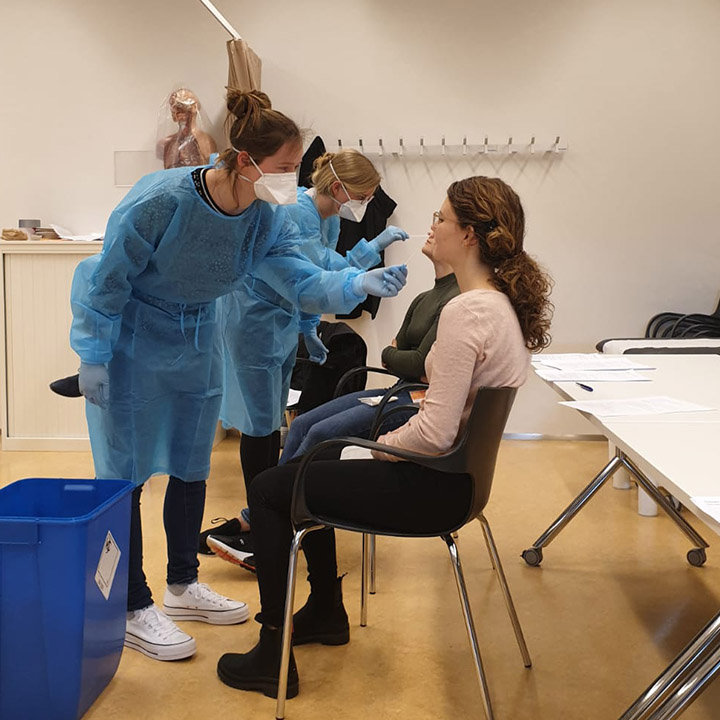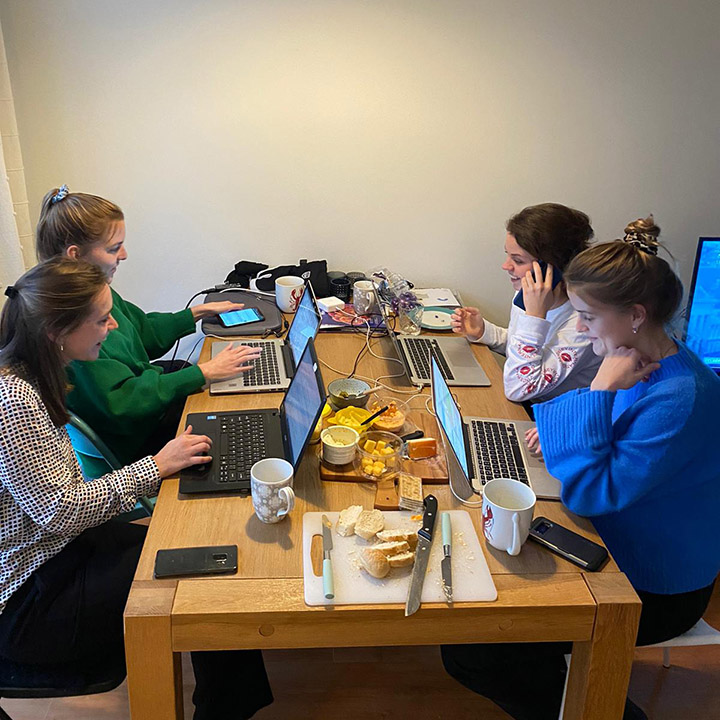



Three months of volunteering
How much good did the do-gooders do?
‘Thank you nursing ward D3, for taking care of me after I had my transplant. I am grateful to you’, reads a digital note in the UMCG unit for lung diseases.
Healthcare workers can now read notes like these on information screens in the hospital thanks to the student volunteers who run the website Er gaat niets boven zorg!. ‘The coronavirus can survive on paper mail, so we were asked to find a digital alternative for supportive notes’, says project team leader David Jan Meijer, a law student at the UG.

When Covid-19 first hit Groningen, Meijer, who’s also chair of student party De Vrije Student, called for all students to join forces. But there’s one thing he’s realised after three months: ‘The most successful initiatives are the ones that were set up in collaboration with the people who need help.’
The platform the UMCG asked his team to create has published over three hundred notes, so clearly it managed to find its audience. Other student services struggled to be of similar use. ‘The main issue is actually finding people who need help’, Meijer confirms.
Special requests
Almost a thousand students registered at the Student voor Stad platform, which was the first to bundle all student initiatives in Groningen offering services like babysitting and providing elderly care. But since all but special requests were referred to partner initiatives, only 140 volunteers were allocated a task.
‘Once we even helped with removing a student’s furniture. She’d had to rush abroad and couldn’t empty her room’, says international relations student Roelof Admiraal.
Once we even helped with removing a student’s furniture
A lot of lonely people, often living in retirement houses, received a card or a call. One man received eighty birthday cards on his fiftieth birthday. His brother-in-law felt sorry that his big birthday party was cancelled due to the corona measures and sent a request to Student voor Stad.
‘We are the students of the city, we want to give something back’, says Admiraal. ‘But the demand for help was not that big in Groningen, so we had to brainstorm how to reach people in need.’
Lisa Braam, a communication student at the Hanze, is one of the eight hundred registered volunteers who are still waiting for their turn to contribute. ‘I was eager to babysit children of people working in healthcare or do some grocery shopping for elderly people’, says Lisa. She’s happy that there has been more supply than demand, though. ‘It means that the situation in Groningen has not escalated that much, so I’m not disappointed.’

Oppassistent, an initiative to babysit the children of healthcare workers, had 277 volunteers sign up. In total, 160 families with children asked for help. ‘We were able to help out a hundred of them’, says medical student Hannah Vijverberg, one of the project’s four founders. ‘Some families live outside of Groningen, so it was hard sometimes to find a student who lived near them or could come over.’
Although some professional guest parents were angry – ‘They said we were stealing their jobs’ – the healthcare workers were happy with Oppasassistent’s help, which got them through the sudden closure of schools at the beginning of the lockdown.
Yet Oppassistent had to disappoint over a hundred do-gooders, like Marthe Hoek. She’s getting her master’s degree in Dutch law and suddenly had a lot of spare time when the university closed. ‘I wanted to help out, so at first, it felt a bit disappointing that I was not needed.’
Professionals said we were stealing their jobs
Marthe registered at several volunteer websites in the hopes that her babysitting experience would be of use. It didn’t work out that way, because Oppasassistent only employed medical students. ‘After two weeks, I got busier with my studies again, so I didn’t really mind it anymore. Now I’m just happy that so many people volunteered.’
Nursing homes

And then there was the website CovidVrijwilliger, which aimed to connect medical students with healthcare institutes in need of helping hands. ‘Smaller organisations, like provincial nursing homes, were very happy with the initiative’, says medical student Elisa ter Kuile, who volunteered. ‘They often don’t know how to find extra help.’
But here too, the number of volunteers far outstripped demand, even though only students with certain medical skills could sign up. Of the 1,113 volunteers, four hundred were matched with thirty organisations. ‘We can be proud of what we did in the past two months,’ says Ter Kuile, ‘because the main goal of CovidVrijwilliger was to address the needs of the health care sector, not the students. And we have managed to meet almost all the demand.’
The main goal was to address the needs of the health care sector
Medical students assisted at a special out-of-hours GP service for corona-suspected patients, for example, and transcribed interviews with people who tested positive for the coronavirus for a study on their first symptoms.
De StudentenService, an enterprise predating the pandemic, wanted to help as well. General manager Daniel Logt launched a campaign to help people in self-isolation with everyday chores ranging from grocery pickups to dog walking for a small fee. The idea didn’t prove fruitful at all. ‘We haven’t received any applications from people in need’, admits Logt. ‘Probably because there are many other initiatives in Groningen.’
Reward in itself
Still, says professor of social psychology Arie Dijkstra, just wanting to help is a reward in itself. It can be a good distraction from the stressful student life, and if you are registered as a volunteer, you get positive feelings of connection. ‘I bet it felt good, even if some students didn’t get a chance to help out’, he says. ‘And times of crisis are known for creating bonds between people, which also feels good.’
Dijkstra believes the mismatch between the good intentions of the students and the actual need for their help can be explained by a lack of knowledge and communication. ‘The worlds of students and say, elderly people in need are very much separated. They don’t know about each other.’
Moreover, most people chose to rely on their social networks and used existing solutions for their problems. ‘But it’s a big success when you see so many students willing to help. They have proved themselves to be community members that can be valued.’

